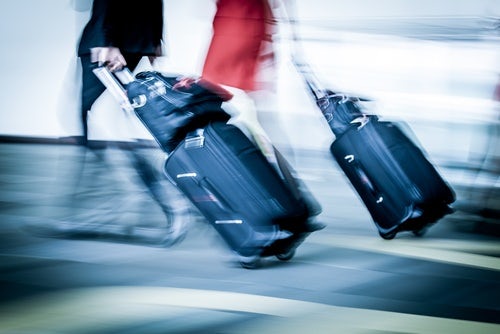
While more than one-third of corporate travelers typically feel positive about travelling for business, that doesn’t mean they all enjoy a stress-free experience. In fact, a massive 93 percent of business travelers heading to international destinations feel stressed-out at some point along their journey.
The info comes from a survey conducted by Booking.com, which collected responses from 4,500 corporate travellers from eight different countries. So where is all this travel-related stress coming from? American business travellers are most anxious about:
- 32 percent: Missing a flight or train
- 26 percent: Language issues or barriers
- 22 percent: Possibility of lost luggage
- 21 percent: Being in unfamiliar territory
- 18 percent: Getting around the city
- 18 percent: Losing essential documents, such as passport or presentation
- 17 percent: IT setup, possibility devices won’t work
- 16 percent: Canceled meetings
- 16 percent: Meeting or presenting to people they don’t know
- 13 percent: Cultural differences
- 12 percent: Losing a company-owned laptop, mobile phone or other device
AIRPORT ANGST
The biggest stressors by far for American corporate travellers erupt in and around the airport. International travel delays and cancellations topped the anxiety list, with a 47-percent vote. Thirty-two percent were most concerned about missing their flight, while jet lag was most loathed by 42 percent of the respondents. Airport security was another stress point for 26 percent of American business travellers.
DESTINATION DISTRESS
Once American business travelers land in foreign lands, many encounter a whole new set of stressors. More than one-quarter of American travelers are anxious about language barriers and issues, while 21 percent fret about being in unfamiliar territory. Cultural differences bring angst to 13 percent.
Related: 8 Key Tips for Business Travellers
MISSING FAMILY AND FRIENDS
Simply being away from their families and friends is another source of anxiety, with more than one-third pegging it as their least favorite aspect about travel. Men are a shade more likely than women to feel this way, with 40 percent of men deeply missing their favorite folks, compared to 34 percent of women.
OTHER STRESSORS
While the Booking.com survey touched on the most common stressors, myriad others are likely to be part of the business travellers’ mix. These include pre-travel planning activities, finding and booking accommodations, and arranging ground transportation to the airport and at their ultimate destination. Getting around an unfamiliar city can also induce worry, as can meeting and presenting to new people for the first time.
Don’t forget the need to hang onto receipts, figure out if your meals and other purchases are compliant, and track your other expenses. Add a decrease in regular exercise, less-than-healthy food choices, and a lack of sleep, and it’s no wonder business travellers pack along stress wherever they go.
If you're interested in hearing more about how to improve your business travellers' happiness, attend the Business Travel News Business Travel Happiness Index webinar, held on May 5 at 10am PT / 1pm ET.
Search
Subscribe
Latest Posts
Posts by Category
Our choice of Chrome River EXPENSE was made in part due to the very user-friendly interface, easy configurability, and the clear commitment to impactful customer service – all aspects in which Chrome River was the clear winner. While Chrome River is not as large as some of the other vendors we considered, we found that to be a benefit and our due diligence showed that it could support us as well as any large players in the space, along with a personalized level of customer care.
We are excited to be able to enforce much more stringent compliance to our expense guidelines and significantly enhance our expense reporting and analytics. By automating these processes, we will be able to free up AP time formerly spent on manual administrative tasks, and enhance the role by being much more strategic.